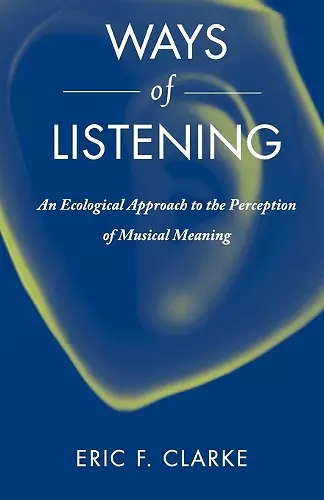Ways of Listening
An Ecological Approach to the Perception of Musical Meaning
Format:Paperback
Publisher:Oxford University Press Inc
Published:26th Jan '12
Currently unavailable, and unfortunately no date known when it will be back
This paperback is available in another edition too:
- Hardback£89.00(9780195151947)

In recent years, many psychologists and cognitive scientists have published their views on the psychology of music. Unfortunately, this scientific literature has remained inaccessible to musicologists and musicians, and has neglected their insights on the subject. In Ways of Listening, musicologist Eric Clarke explores musical meaning, music's critical function in human lives, and the relationship between listening and musical material. Clarke outlines an "ecological approach" to understanding the perception of music. The way we hear and understand music is not simply a function of our brain structure or of the musical "codes" given to us by culture, Clarke argues. Instead, cognitive, psychoacoustical, and semiotic issues must be considered within the physical and social contexts of listening. In essence, Clarke adapts John Gibson's influential ecological theory of perception to the complex process of perceiving music. In addition to making a theoretical argument, the author offers a number of case studies to illustrate his concept. For example, he analyzes the experience of listening to Jimi Hendrix's performance of the Star Spangled Banner at Woodstock in 1969. Clarke examines how Hendrix's choice of instrument and venue, use of distortion, and the political climate in which he performed all had an impact on his audience's perception of the anthem. A complex convergence of broad cultural contexts and specific musical features - the entire "ecology" of the listening experience - is responsible for this performance's impact. Including both the best psychological research and careful musicological scholarship, Clarke's book offers the most complex and insightful perspective on musical meaning to date. It will be of interest to musicologists, musicians, psychologists, and scholars of aesthetics.
This challenging, impressive study implies new ways of thinking about music and listening. No other books cover the same territory. * Choice *
This is the first book to place an ecological approach to perception at the core of music theory. The result is that many problems created by the hitherto dominant cognitive approach simply disappear: emotion and meaning emerge as primary attributes of music (as common sense might always have suggested). Clarke's highly approachable book, with its wide range of musical case studies, will prompt both musicians and psychologists to rethink some of their most basic assumptions. * Nicholas Cook, Royal Holloway, University of London *
Using a holistic approach to perception, Clarke captures the particularity and import of that unique aspect of musical sound Roland Barthes called 'the grain of the voice.' Through this, he is able to build a rich and textured account of musical meaning equally applicable to W.A. Mozart and P.J. Harvey. This important and innovative book offers a fresh perspective on music cognition that will be much discussed in the years to come. * Lawrence Zbikowski, University of Chicago Department of Music *
ISBN: 9780199773909
Dimensions: 140mm x 216mm x 15mm
Weight: 327g
256 pages